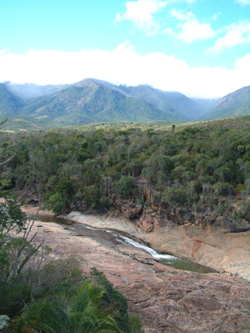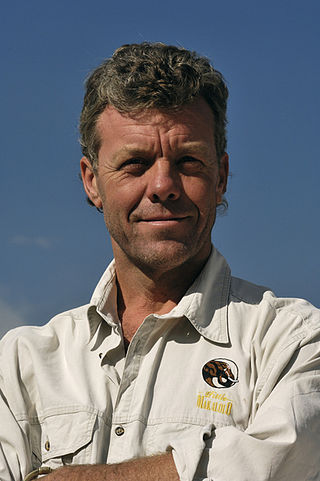
Sylvia Alice Earle is an American marine biologist, oceanographer, explorer, author, and lecturer. She has been a National Geographic Explorer at Large since 1998. Earle was the first female chief scientist of the U.S. National Oceanic and Atmospheric Administration, and was named by Time Magazine as its first Hero for the Planet in 1998.

Komodo National Park is a national park in Indonesia located within the Lesser Sunda Islands in the border region between the provinces of East Nusa Tenggara and West Nusa Tenggara. The park includes the three larger islands Komodo, Padar and Rinca, and 26 smaller ones, with a total area of 1,733 km2. The national park was founded in 1980 to protect the Komodo dragon, the world's largest lizard. Later it was dedicated to protecting other species, including marine species. In 1991 the national park was declared a UNESCO World Heritage Site and a Man and Biosphere Reserve. It is considered one of the world's 25 biodiversity hotspots.

The national parks of Madagascar include all officially recognized protected areas as of 2015. The protected areas network of Madagascar is managed by the Madagascar National Parks Association (PNM-ANGAP). The network includes three types of protected areas: Strict Nature Reserves, National Parks and Wildlife Reserves. At the 2003 IUCN World Parks Congress in Durban, the Malagasy President, Marc Ravalomanana, announced an initiative to more than triple the area under protection from approximately 17,000 km2 (6,600 sq mi) to over 60,000 km2 (23,000 sq mi). This "Durban Vision", as it has been dubbed, involved broadening the definition of protected areas in the country and legislation has been passed to allow the creation of four new categories of protected area: Natural Parks, Natural Monuments, Protected Landscapes, and Natural Resource Reserves. As well as allowing these new objectives for protected areas management, the new legislation also provided for entities other than PNM-ANGAP to manage protected areas, such as government ministries, community associations, NGOs and other civil society organizations, and the private sector.

The Skoll Foundation is a private foundation based in Palo Alto, California. The foundation makes grants and investments intended to reduce global poverty. Jeffrey Skoll created the foundation in 1999.
Sustainable seafood is seafood that is caught or farmed in ways that consider the long-term vitality of harvested species and the well-being of the oceans, as well as the livelihoods of fisheries-dependent communities. It was first promoted through the sustainable seafood movement which began in the 1990s. This operation highlights overfishing and environmentally destructive fishing methods. Through a number of initiatives, the movement has increased awareness and raised concerns over the way our seafood is obtained.

The World Wide Fund for Nature (WWF) is a Swiss-based international non-governmental organization founded in 1961 that works in the field of wilderness preservation and the reduction of human impact on the environment. It was formerly named the World Wildlife Fund, which remains its official name in Canada and the United States. WWF is the world's largest conservation organization, with over five million supporters worldwide, working in more than 100 countries and supporting around 3,000 conservation and environmental projects. They have invested over $1 billion in more than 12,000 conservation initiatives since 1995. WWF is a foundation with 65% of funding from individuals and bequests, 17% from government sources and 8% from corporations in 2020.

The Buckminster Fuller Challenge is an annual international design competition that awards $100,000 to the most comprehensive solution to a pressing global problem. The Challenge was launched in 2007 and is a program of The Buckminster Fuller Institute. The competition, open to designers, artists, architects, students, environmentalists, and organizations world-wide, has been dubbed "Socially-Responsible Design's Highest Award" by Metropolis Magazine.
Velondriake, meaning “to live with the sea” in the Vezo dialect of the Malagasy language, is a locally managed marine area (LMMA). Established in 2006 in southwest Madagascar, Velondriake is home to over 7,000 resident Vezo people and covers a marine and coastal area of about 64,000 ha making it one of the largest LMMAs in the western Indian Ocean. The LMMA includes extensive coral reefs, mangroves, seagrass beds, baobab forests, spiny forest and other threatened habitats. The LMMA includes five permanent coral reef reserves, two permanent mangrove reserves, and numerous periodic fisheries closures (PFCs), primarily for octopus on reefs and for mud crab in mangroves.
Bobby Chinn is an American international chef, television presenter, restaurateur and cookbook author. He is a culinary celebrity across Asia and the Middle East, thanks to his role as host of Discovery TLC's World Cafe, and as a judge on MBC's Top Chef Middle East. He opened two award-winning restaurants in Vietnam – Restaurant Bobby Chinn in Hanoi (2001) and Bobby Chinn Saigon in Ho Chi Minh (2011), then relocated to London in 2014 and opened the House of Ho Vietnamese restaurant.
Tusk Trust is a British non-profit organisation set up in 1990 to advance wildlife conservation across Africa. The charity funds the protection of African elephant, African rhinoceros and African lion, along with many other threatened species across Africa. Tusk’s mission is to amplify the impact of progressive conservation initiatives across Africa.
Aquaculture in Madagascar started to take off in the 1980s. The industry includes the cultivation of sea cucumbers, seaweed, fish and shrimp and is being used to stimulate the country's economy, increase the wages of fishermen and women, and improve the regions ocean water quality. Coastal regions of Madagascar are reliant on the Indian Ocean's marine resources as a source of food, income, and cultural identity.
The Wainwright Prize is a literary prize awarded annually for the best work of general outdoors, nature and UK-based travel writing. In 2020 it was split into the Wainwright Prize for UK nature writing and the Wainwright Prize for writing on global conservation, with separate longlists and judging panels. It is restricted to books published in the UK. For three years from 2022 the prizes will be sponsored by Kendal paper-makers James Cropper plc and known as the James Cropper Wainwright Prizes. A prize for writing for children was introduced in 2022, the three prizes being the James Cropper Wainwright Prize for Nature Writing, the James Cropper Wainwright Prize for Writing on Conservation and the James Cropper Wainwright Prize for Children's Writing on Nature and Conservation.

Blue economy is a term in economics relating to the exploitation, preservation and regeneration of the marine environment. Its scope of interpretation varies among organizations. However, the term is generally used in the scope of international development when describing a sustainable development approach to coastal resources and ocean development. This can include a wide range of economic sectors, from the more conventional fisheries, aquaculture, maritime transport, coastal, marine and maritime tourism, or other traditional uses, to more emergent activities such as coastal renewable energy, marine ecosystem services, seabed mining, and bioprospecting.

Pete Oxford is a British-born conservation photographer based in Cape Town, South Africa, after living in Quito, Ecuador for several years. Originally trained as a marine biologist, he and his wife, South African-born Reneé Bish, now work as a professional photographic team focusing primarily on wildlife and indigenous cultures.
Will Burrard-Lucas, is a British wildlife photographer and entrepreneur. He is known for developing devices, such as BeetleCam and camera traps, which enable him to capture close-up photographs of wildlife.
Harambee Youth Employment Accelerator is a South African nonprofit founded to address the youth unemployment crisis by connecting employers to first-time job seekers.

Nicola Galombik is a South African social entrepreneur and businesswoman, known for founding Harambee Youth Employment Accelerator, an award-winning South African nonprofit. She currently serves as the executive director of Yellowwoods, an investment holding company based in South Africa. Her career has included developing policy for the government of Nelson Mandela, and creating the education strategy for South African Broadcasting Corporation.

RealNZ is a New Zealand tourism company based in Queenstown. The company offers a range of travel, cruises and excursions in Queenstown, Milford Sound / Piopiotahi, Te Anau, Fiordland and Stewart Island / Rakiura. It also operates two skifields Cardrona Alpine Resort, and Treble Cone, and the International Antarctic Centre in Christchurch. The company is the successor of a series of acquisitions in the South Island tourist sector over more than 60 years. The brand RealNZ was launched in October 2021 to bring together multiple brands and businesses including Real Journeys that were previously part of the Wayfare Group, although some of the businesses have retained individual branding.

Gab Mejia is a Filipino conservation photographer based in Manila, Philippines.











